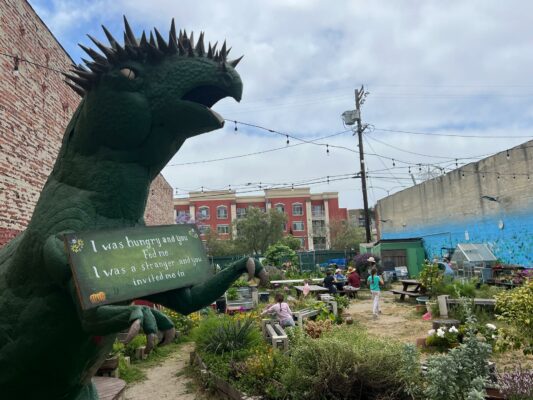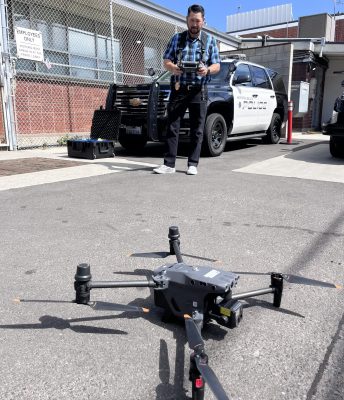
As hundreds of Catalina Classic paddlers and their escorts gathered at Catalina Island’s Two Harbors Saturday evening to listen to race instructions and race lore from Buddy Bohn, the founding director’s voice wobbled.
On his mind was Bob Hogan, a father of the 32-mile paddleboarding marathon with a 51 year tradition. Hogan was a Los Angeles County lifeguard when he organize the inaugural Manhattan Beach International Paddleboard Race in 1955. The race ran six times annually, before going dormant after the 1961 race.
Bohn was a young boy back then. He would sit on the railing of the Manhattan Beach Pier, watching competitors cross the finish line. In 1982, Bohn, by then a County Lifeguard, helped resurrect the race, which became known as the Catalina Classic.
“Each year we dedicate the race to someone with significance to our sport,” Bohn said. “It’s important that we know where we came from.”
This year’s race, Bohn said, was in honor of Hogan, who died last December, at the age of 83.
no images were found
“We want Bob to be the winner this year,” Bohn said. To make it happen, part of his ashes would be scattered in the ocean at the starting line when the first horn sounded. Then, 32 miles away, at the Manhattan Pier, Hogan’s widow Carol would scatter the remainder of his ashes in the ocean at the finish line, just ahead of the lead paddler.
“It was beautiful,” Bohn said in reflection the next evening, at the Classic awards ceremony. “We put Bob’s ashes in the water around the start, and as the paddlers pulled around, they said it lit up all of the little fish swimming through the area. It was kind of a sign.”
Island Ingenuity
The race’s 90 participants lived up to the original race’s “international” calling. This year, paddlers arrived at Catalina from across the country, from Europe, Australia and, for the first time, from Tahiti.
Damien Girault, 31, came to Catalina by way of open-water swimmer and Solana Beach resident Gracie van der Byl. A world-beater in her own right, van der Byl holds the record for swimming the Catalina Channel to San Pedro in 2012, with a time of 7:52:11.
“One of the race directors [of Tahiti’s Ironmana challenge], needed a swimmer for an event. They flew me out, I met these guys, and I loved them,” she said of Girault and his team.
The Ironmana is said to be among the most world’s most difficult races, combining stand-up paddling, prone paddling and swimming.
Prone paddling is a relatively new sport in Tahiti, coming to the islands in the mid 2000s. Girault has only prone paddled for three years, and stand-up for five. His first paddleboard was made from foam that lined refrigerator doors, and shaped by a Tahitian friend to get around the high cost of purchasing a board from the states.
“When I first started going to Tahiti, about three years ago, there would maybe be two women and 15 guys, and maybe one or two on a real prone board,” van der Byl said. “Now, it’s not unusual to have 50 riders on 50 prones, and they’re building boards locally now. It’s sparked a whole industry over there.”
American paddlers who have trekked across the Pacific to try their hand at the Ironmana have been humbled by the locals.
Athletes have come from stand-up and outrigger paddling, which are closer to the Tahitian tradition, and jumped to prone, Girault said of Tahiti’s prone paddling boom. “Every kind of generation,” he said. “We think it’ll become part of the Tahitian spirit, too.”
Girault finished the Classic with a time of 6:55:10, tired and with sore shoulders, but happy.
The Race
Daylight was breaking as the race’s 90 participants lined up on the beach at Two Harbors as coffee and a bonfire, a Classic tradition, cooled behind them.
At 6 a.m., the horn sounded, and the paddlers were off, splitting the space between moorings, their boats, and the sleepy sailors within their confines.
An early breakaway pack of three paddlers, followed closely behind by two more packs, set the pace. The Body Glove boat Disappearance led the pack toward Manhattan Beach with Ronnie Meistrell at the helm, just as it had done for decades when Ronnie’s father Bob captained the lead boat.
The water was calm and glassy, with few swells, and the skies were overcast for much of the morning, creating near-ideal conditions.
Around 8:30 a.m., Meistrell perked up. A container ship was coming from the east toward the coast, and fast. He wanted to avoid a repeat of last year, when eventual winner Dan Mann narrowly crossed behind a freighter.
Given the ship’s speed, and the speed of the front of the pack, the leaders were not looking as if they’d be affected. But the middle and back of the pack would need to pull up if the freighter continued on its course.
“[Container ships] always concern me. They can’t stop,” Meistrell said between checks of the radio with local coastal authorities and with the cargo ship, itself. The CSCL Summer was nearly 1,100 feet and capable of carrying 121,000 tons of cargo. Even if it were to cut its engines, Meistrell said, it would coast until it reached the Port of LA.
But after 10 minutes of pacing between the radio and the windows, binoculars in hand, Meistrell relaxed.
“It looks like he changed course,” he said, seeing that the CSCL Summer, about five miles away had turned south-bound and was nearly parallel to Disappearance.
Soon after, the R10 buoy was in sight of the leaders, putting the race on its final leg, and setting the table for a shootout between 2014 Catalina Classic runner-up Canon Smith, 2016 R10 Paddleboard Race runner-up Robert Parucha and Max First, winner of the 2014 Classic and 2016 R10. The 22-mile R10 race is held each Father’s Day and runs from Two Harbors To Cabrillo Beach.
The first to fall out of the pack was Parucha. He would finish fourth overall with a time of 5:26:02 in just his third time paddling the Classic.
First, who trailed the other two crossing the channel, reeled in Smith shortly after reaching the R10 buoy, which is 7.2 miles from the Manhattan pier. For the next several miles the two exchanged leads, but it was apparent Smith’s left shoulder was bothering him. After intervals on his knees, he gave up precious seconds to sit up and stretch the shoulder.
First, maintained a consistent pace, alternating between prone and knee paddling, until finally gapping Smith.
First crossed the finish line with a time of 5:19:36, less than two minutes ahead of Smith. First stood on his 18-inch wide, 18-foot long board, raised both arms in the air, and toppled backwards into the warm water.
“That was the biggest thing,” he said at the awards dinner at Dive N’ Surf, held just a few hours after the race. “I raced my own race, kept a steady, consistent pace, and I didn’t change my cadence very much.”
The gap between Women’s Division winner 18 year old Abby Brown of Santa Barbara, who finished at 6:31:41, and her next-closest competitor, DJ O’Brien, of the South Bay, was only 49 seconds. According to Brown, who had been plagued with stomach problems throughout the race, it came down to a sprint in the Classic’s final quarter-mile.
“I felt so bad in the first half of the race; when DJ passed me, I didn’t think I could come back,” Brown said.
Mid-channel, she said, she’d been sick, and that the nutrition she’d been taking in to keep paddling wouldn’t stay down. Around the R10 buoy, Brown was about half a mile behind O’Brien.
“Then something inside of me said ‘just put your head down and sprint,’” Brown recalled.
Brown caught O’Brien and dug into her reserves of strength, pulling out the win.
The victory was Brown’s second at a major paddleboard race in less than a month; on July 31, Brown won the Women’s Stock division at the Molokai-2-Oahu Paddleboard World Championships in Hawaii. She had nutrition issues there, as well.
“I couldn’t stomach anything during that race, either, which was weird — it’s never been a problem on the long paddles before and I had minimal food on both.”
“I knew, statistically, I had a chance, but I didn’t think I’d come away with it,” she said. “I’m just stoked.”
The biggest shakeup of the night came from Stock division winner Lachie Lansdown, who finished at 5:38:55, shredding the 2014 record Stock record set by Lockwood Holmes. (Holmes, finished third-overall, competing in the Unlimited division this year). This is Lansdown’s second consecutive stock win at Catalina, giving him two spots on the Classic’s Perpetual Trophy to go alongside his new record for the 12-foot stock paddleboard division.
“I don’t think it’s sunk in yet, but it’s pretty amazing,” Lansdown said at the awards ceremony, where he was almost too shy to speak when receiving his awards. “I had guys right on me the whole way — Jack Bark, Nico Fox — it was a fast stock year.”
Lansdown then smiled and looked at the yellow, big wave board shaped by Joe Bark. Each of the top finishers received a new Bark gun. “Looks like I’ve gotta go find some big waves, he said” ER










